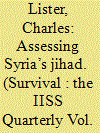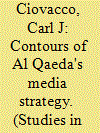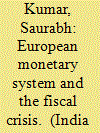| Srl | Item |
| 1 |
ID:
138611


|
|
|
|
|
| Summary/Abstract |
The conflict in Syria has changed significantly since the first signs of an armed insurgency began to emerge in late May 2011. While the largely nationalistminded Free Syrian Army (FSA) gradually devolved into an amorphous gathering of locally focused militia units with minimal command links to a leadership in Turkey, the capabilities and influence of Salafist and Sunni
jihadist groups expanded considerably.
|
|
|
|
|
|
|
|
|
|
|
|
|
|
|
|
| 2 |
ID:
166942


|
|
|
|
|
| Summary/Abstract |
An assessment model is built to investigate the degree of order in the organisational structure of the electricity regulatory institution (ERI) in China. The model is based on Shannon entropy and is constructed from the perspective of timeliness and accuracy of the flow of information. The model is then used to evaluate the degree of order in the organisational structures of the ERI during three stages of reform that occurred during 2002–13. The results indicate that the reforms and improvements made in the organisational structure of China's ERI have resulted in a stepwise increase in their degree of order (corresponding to 0.3156, 0.3277, and 0.3324 in the three stages, respectively). On this basis, a scheme is put forward to optimise the degree of order in the structure of the energy regulatory institution in the current stage. The results show that downsizing the internal and subordinate departments appropriately and creating more governmental agencies to regulate energy are conducive to further improving the degree of order of the energy regulatory institution. Finally, we use principal component analysis to propose a priority scheme for adding more regulatory governmental agencies based on sorted energy production and consumption data.
|
|
|
|
|
|
|
|
|
|
|
|
|
|
|
|
| 3 |
ID:
091438


|
|
|
|
|
| Publication |
2009.
|
| Summary/Abstract |
Al Qaeda has crafted a successful media strategy that is adeptly suited for the war of ideas against the United States. Osama bin Laden and Ayman al-Zawahiri have demonstrated a great ability to lead plural groups and exploit innovation with the use of technology. This article explores how they have connected with diverse audiences around the world with a constant message. The repetition of their platform themes and use of "message projection opportunities" demonstrate a great understanding of human nature, marketing strategy, global media, and world politics. In line with Prospect Theory, bin Laden and Zawahiri's messaging strategy emphasizes stemming losses over solidifying gains. Only through a better understanding of Al Qaeda's media strategy and all of its strengths, weaknesses, and idiosyncrasies can the United States truly recognize what it is up against and begin to construct an effective and comprehensive counter strategy.
|
|
|
|
|
|
|
|
|
|
|
|
|
|
|
|
| 4 |
ID:
114066


|
|
|
|
|
| Publication |
2012.
|
| Summary/Abstract |
The episode of fiscal crisis in the Euro zone has now become a recurrent theme of debate and has attracted a range of experiences regarding the nature of fiscal turmoil, its causes and effects, which vary widely across individual countries. The confidence in the European monetary system has been confounded with the European fiscal turmoil. The phases of its revival and by what method it will recoil, and at what velocity, are unanswered questions. At the centre of the European monetary system is the European Central Bank (ECB) which shapes and conducts a vigorous and complex set of policies and institutional arrangements that represent the image of neoliberal economic ideology. The debate over the European monetary system's architecture has significant ideological, economic and political implications. This article approaches the debate by assessing the monetary policy strategy and in particular the organisational structure of the ECB, and what role they play in the conduct of economic and monetary course of action in the Euro zone.
|
|
|
|
|
|
|
|
|
|
|
|
|
|
|
|